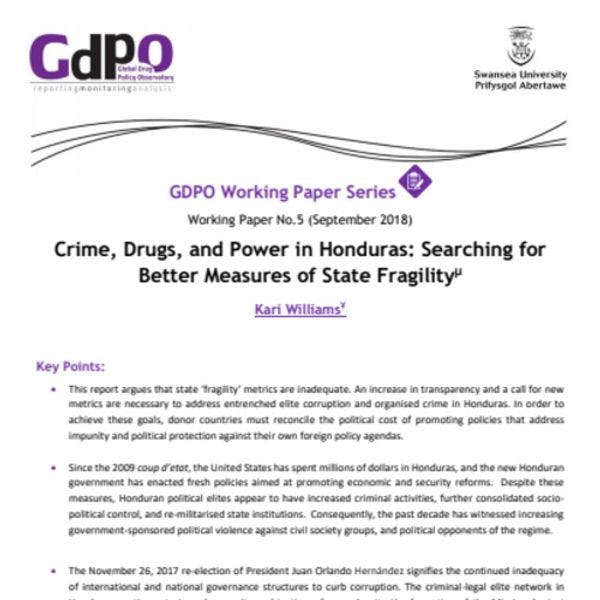Crime, Drugs, and Power in Honduras: Searching for Better Measures of State Fragility
20 September 2018
Global Drug Policy Observatory (GDPO)
By Kari Williams
- This report argues that state ‘fragility’ metrics are inadequate. An increase in transparency and a call for new metrics are necessary to address entrenched elite corruption and organised crime in Honduras. In order to achieve these goals, donor countries must reconcile the political cost of promoting policies that address impunity and political protection against their own foreign policy agendas.
- Since the 2009 coup d’etat, the United States has spent millions of dollars in Honduras, and the new Honduran government has enacted fresh policies aimed at promoting economic and security reforms. Despite these measures, Honduran political elites appear to have increased criminal activities, further consolidated sociopolitical control, and re-militarised state institutions. Consequently, the past decade has witnessed increasing government-sponsored political violence against civil society groups, and political opponents of the regime.
- The November 26, 2017 re-election of President Juan Orlando Hernández signifies the continued inadequacy of international and national governance structures to curb corruption. The criminal-legal elite network in Honduras continues to impede security and justice reforms, despite the formation of the Mission Against Corruption and Impunity in Honduras (MACCIH). 1 Deeply embedded criminal-elite interests and insensitive assistance by the United States and other international donors have contributed to reform inertia
- State fragility ranking organisations, like the Organisation for Economic Co-operation and Development (OECD), utilise state fragility frameworks to address issues of state instability. Yet fragility ranking organisations do not provide adequate access and transparency to their national fragility reports and related data to broaden civil society engagement
- The OECD States of Fragility Framework would benefit from the inclusion of a multi-dimensional elite power fragility indicator potentially as a principle component measurement that incorporates the OECD violence lens, corruption, and elite capture across all five fragility dimensions. An elite power fragility indicator may also provide some insight into criminal-legal elite networks within donor countries, highlighting the complexity of addressing transnational elite corruption across borders
- New metrics that align the United Nations Sustainable Development Goals (SDGs), drug policy, and local citizen security indicators alongside fragility metrics have the potential to provide a multi-level governance approach to guide security, economic assistance, and transparency. However, as long as international donors utilise ranking systems in silos and prioritise conflict-insensitive aid policies, aid will continue to be channelled through corrupt operating systems and efforts to support sustainable development and anti-corruption reforms will be undermined
Downloads
Regions
Related Profiles
- Global Drug Policy Observatory (GDPO)
